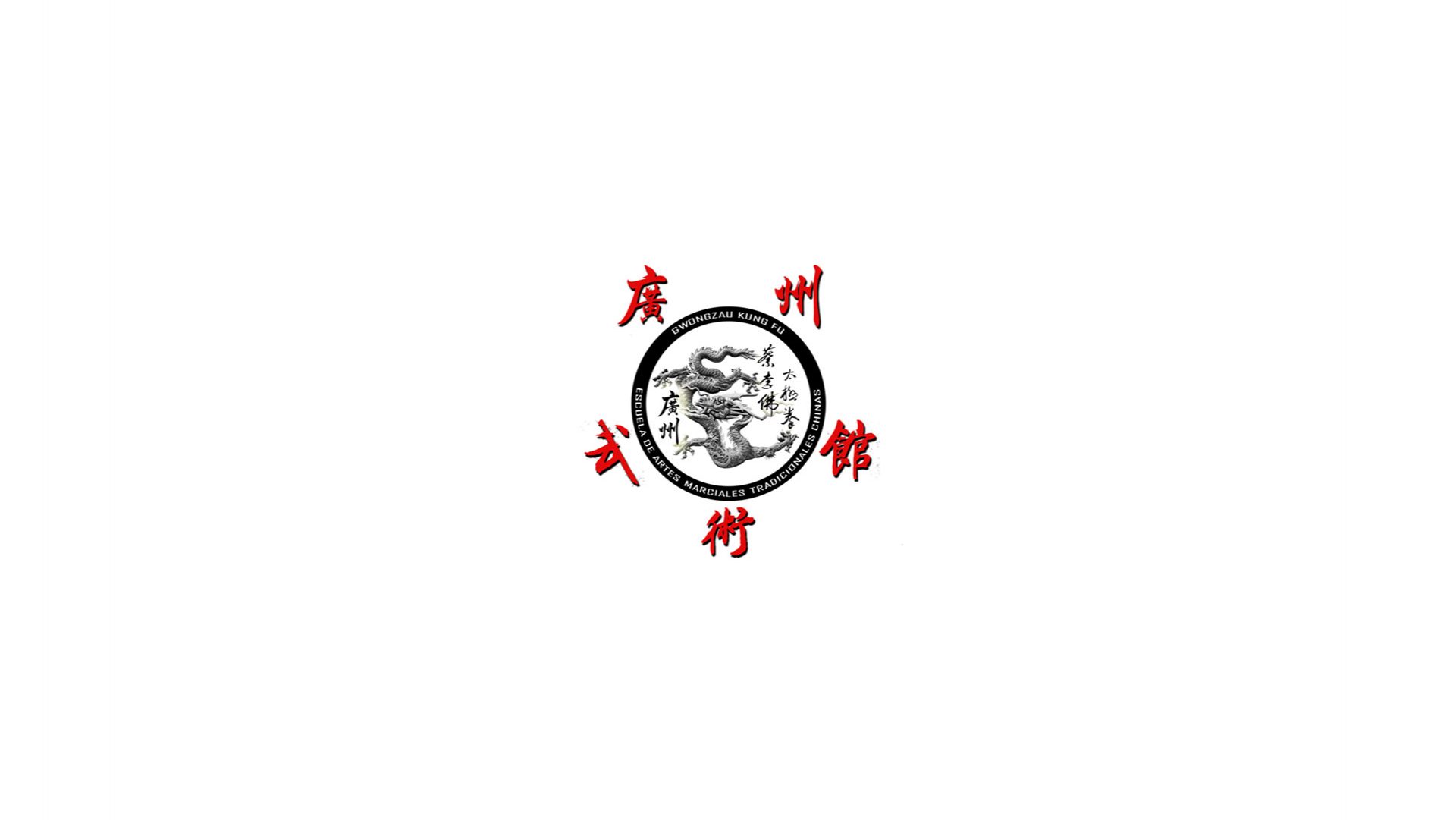Introduction:
In the two previous articles on the afterlife in Chinese culture we have exposed fundamental concepts of the Chinese worldview concerning the world of the dead; we have seen how is the beginning of the journey to the underworld, in which the deceased finds the Ten Kings or Ten Courts of King Yánluó (十殿閻羅 shí diàn Yánluó), and we have reviewed how this mythology was gradually formed, taking as a model the world of the living. We recommend reading them to better understand this article.
One idea that has troubled the Chinese mentality throughout its history is that of wrongful death or "death in vain" (枉死 wǎng sǐ). As we have already seen, in the underworld are kept the records of the years of life that have been assigned to each person. But a violent death or accident can cause people to die prematurely, before they have reached their allotted time of life. This is the case that has come to be called "death in vain".
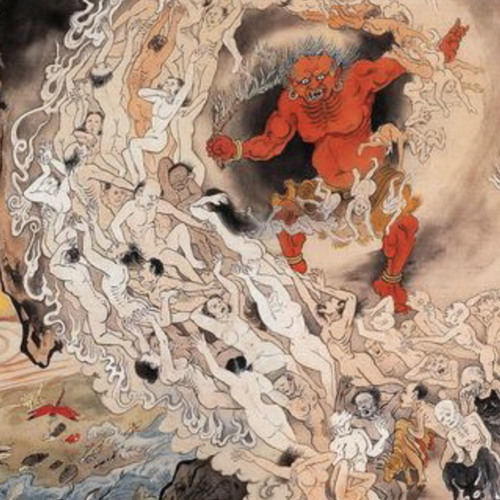
Concept of "death in vain":
The concept of wǎng sǐ, which we can translate as "death in vain" or "wrongful death", comes to designate all cases in which death does not occur naturally. It covers, therefore, deaths caused by murders, wars, suicides, accidents or natural disasters, etc.
As we already know, one of the most important Confucian values is filial piety, whose requirements include leaving offspring, if possible male. In turn, it is the male son who is in charge of the funeral rites of his parents, as well as maintaining the family altar, making regular offerings to the spirits of his ancestors.
We have also mentioned that along with the belongings of the deceased, passes such as the so-called míngtú lùyǐn 冥途路引, "travel permit to the underworld", were included in the tomb, without which the deceased could not cross the Ghost Gate (鬼門關 guǐ mén guān) and access the world of the dead.
Therefore, a death without having had a male heir was a tragedy for the family. Imagine, too, a death in which the corpse cannot be found and therefore the proper burial cannot be given, or a murder in which there is no descendant and no one can take care of the soul of the deceased. These are all cases of death in vain.
But, depending on the causes of death, the fate of the soul of the deceased can be very different.
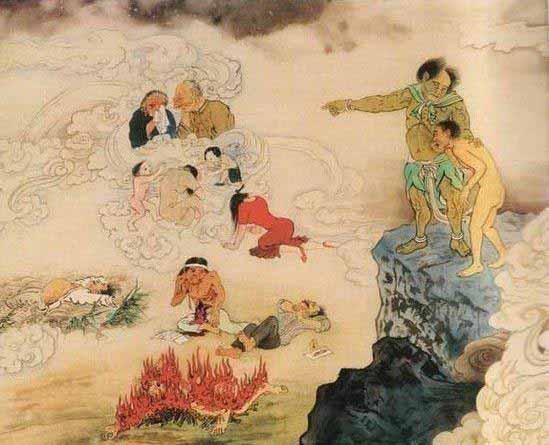
Destiny of the souls:
In the best case, when death in vain occurs due to a good deed of the deceased (a "great good", 大善 dà shàn), such as dying to save another person in danger, the soul can immediately ascend to Heaven (Tiān 天), becoming an immortal (xiān 仙).
At the opposite extreme, that is, if one dies in vain due to one's evil deeds (a "great evil", 大惡 dà è), as one could be sentenced to death for committing crimes, one goes straight to the hells (shíbā dìyù 十八地獄, "eighteen earth prisons"), the lowest of the six realms of existence (liùdào 六道).
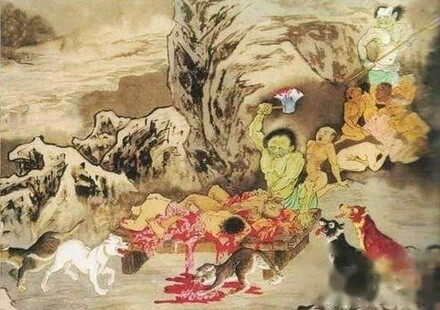
Hells (shíbā dìyù 十八地獄).
But, with these few exceptions, death in vain entails an uncertain fate for the deceased, who becomes a lonely soul, who is tied to the place of death and wanders on the border between the yīn and the yáng world.
In this case, the soul must wait for the assigned days of life on earth to be fulfilled in order to access the underworld and continue its path to reincarnation. Faced with this fate, the bodhisattva Dìzàng 地藏 created the City of the Dead in Vain (枉死城 Wǎngsǐchéng), to house these souls until they fulfill their allotted days.
During the period of permanence in Wǎngsǐchéng, the deceased cannot receive the offerings that the living make from the yáng world. These offerings are temporarily stored in the afterlife until the deceased fulfills his allotted days and is released from the city.
In popular belief, this city appears divided into an internal and an external part. In the latter are the souls of those who died involuntarily, that is, due to negligence or lack of own expertise, such as drowning.
For the suicides, on the other hand, the Chinese afterlife reserves a terrible destiny. It is said that the soul of the deceased repeats the same action that triggered his death once every day, and that they will not be able to leave the place of death until they find a substitute to replace them.
In Taiwan, the so-called Yīnmiào 陰廟, "Dark Temples", are dedicated to the souls of ghosts who died prematurely.
The unjust death:
Finally, there are the cases of death because of great injustice (大冤 dà yuān), such as the murders of innocent people. It is believed that the ghosts of those who die unjustly cannot cleanse their hearts of resentment until they see their aggressor receiving his punishment in the underworld.
In this case, the souls remain in the City of the Dead in Vain until the death of their murderer occurs. From inside this city, they observe the torture to which their aggressor is subjected and only then can they proceed to receive their trial.
In extreme cases of wrongful death, King Yánluó can decree a reincarnation for revenge, or give the order known as "black flag" (黑令旗 hēi lìngqí), which forces the enemy of the deceased to exchange his life for that of his victim.
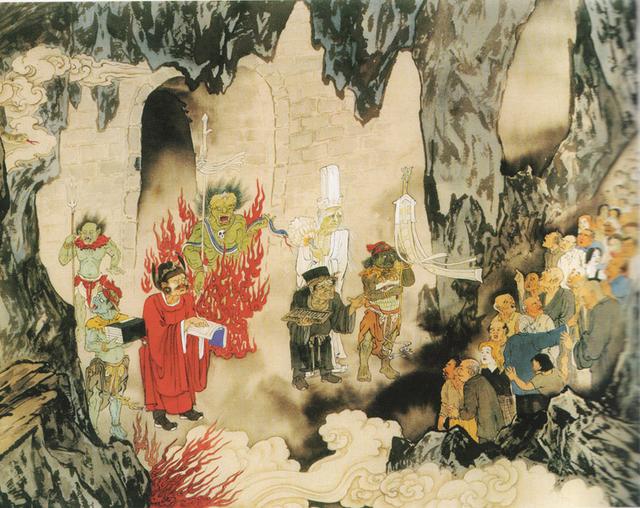
In the classic Chinese novel Journey to the West (Xīyóuiì 西遊記) there is the case of Chén Guāngruǐ 陳光蕊. He is on his way to take possession of an official post accompanied by his wife, when is killed by a boatman who throws his corpse into the river and, taking his wife by force, adopts the identity of the deceased to take possession of the position himself.
But the Dragon King (龍王 Lóngwáng) of the river, who owed Guāngruǐ a favour, inserts a pearl into his mouth so that his body is preserved. Many years later, when the murderer is finally executed and his heart and liver are offered to Guāngruǐ's soul at the place of death, the Dragon King releases the body of the deceased and he comes back to life, reuniting with his wife.
Conclusions:
The ideas about "death in vain" reveal the concerns of the Chinese mentality about the afterlife, and the importance given to male offspring, who must take care of the rites and care of the soul of the deceased.
When this does not occur, the soul is trapped between the world of the living and that of the dead, becoming a "lonely wild ghost" (gūhún yě guǐ 孤魂野鬼).
In the next article on the afterlife we will see what the end of the deceased's journey through the underworld is like, until the soul is reincarnated again, beginning a new cycle of existence.
